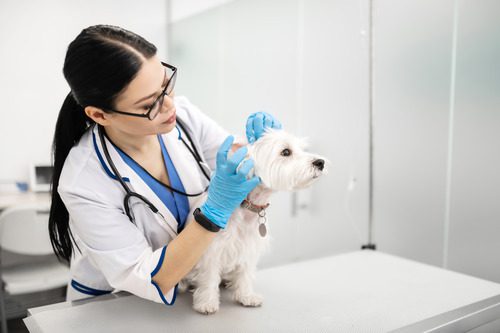Swollen Ears in Dogs: Causes and Common Treatment
If your dog’s ear suddenly looks swollen or puffy, it’s easy to assume it’s something minor, but that swelling could be your dog’s way of telling you something’s wrong. From uncomfortable infections to allergic reactions or even blood-filled pockets called hematomas, swollen ears in dogs can point to a range of issues that require attention. The good news is, once you understand the potential causes, you’ll know exactly when it’s time to take action. In this blog, we’ll walk through the most common reasons for ear swelling, what symptoms to look for, and how your veterinarian may treat the problem. Keep reading to better understand what’s going on with your dog and how to help them feel better faster.

What Does It Mean When a Dog Has a Swollen Ear?
Ear swelling in dogs is a symptom, not a condition by itself. It usually indicates that something is irritating the ear or affecting the tissues beneath the skin. In some cases, the swelling is limited to the ear flap (pinna), while in others, it may involve the ear canal as well. Depending on the cause, your dog might also shake their head frequently, scratch at the ear, or appear sensitive when you touch it. Swollen ears in dogs can result from trauma, allergies, infections, or underlying health issues. Identifying the source of the problem is the first step in determining how to treat it effectively.
Common Causes of Swollen Ears in Dogs
There are several reasons why a dog’s ear might appear swollen. Some are relatively minor, while others require more involved care from a veterinarian. Below are some of the most common causes seen in dogs.
Aural Hematoma
An aural hematoma occurs when blood vessels inside the ear flap rupture, causing blood to pool between layers of skin. It often develops after repeated head shaking or scratching due to ear irritation. An aural hematoma can cause the ear to look puffy or balloon-like. While not life-threatening, it is uncomfortable and can become more complicated without veterinary care. Treatment usually includes draining the fluid and addressing the underlying cause of the irritation.
Ear Infections
Bacterial or yeast infections are another common reason for swollen ears in dogs. When an infection sets in, inflammation can cause both the ear canal and outer ear to swell. Infected ears may also produce a strong odor, discharge, or redness. Dogs with floppy ears, such as Cocker Spaniels and Golden Retrievers, are particularly prone to ear infections. These breeds may have more moisture and less air circulation in the ear canal, which creates an environment where bacteria and yeast can thrive.
Allergies
Swollen ears in dogs can also be a symptom of allergies. Environmental allergens such as pollen, mold, or dust mites may cause ear inflammation, especially in dogs with underlying sensitivities. Food allergies can also trigger similar symptoms, particularly if the dog’s immune system reacts strongly to certain proteins. When allergies are the cause, dogs often show signs of generalized itching, licking of the paws, or skin redness in addition to swollen ears.
Insect Bites or Stings
Just like people, dogs can react to insect bites or stings with localized swelling. If your dog has been outside and suddenly develops a swollen ear, a bug bite may be to blame. Swelling from a bite or sting is typically confined to one area and may come on quickly. While this type of swelling may go down on its own, it’s still important to contact your veterinarian, especially if your dog has a history of allergic reactions.
Ear Mites
Though more common in puppies and outdoor dogs, ear mites can also cause swollen ears in dogs. These tiny parasites feed on the oils and wax in the ear canal, leading to irritation, inflammation, and dark debris resembling coffee grounds. If ear mites are present, they’ll need to be treated quickly to prevent infection and continued discomfort.
Symptoms That May Accompany Swollen Ears in Dogs
In many cases, swollen ears don’t appear alone. Dogs with ear issues often show additional symptoms that can help point to the underlying problem:
- Head shaking or tilting
- Scratching at one or both ears
- Discharge from the ear canal
- Foul odor from the ears
- Redness or warmth around the ear
- Sensitivity when touched near the head
- Changes in behavior due to discomfort
If your dog is displaying any of these symptoms along with swollen ears, it’s time to schedule an evaluation with your veterinarian. The more information you can provide about your dog’s behavior and environment, the easier it will be for the vet to identify the cause.
How Swollen Ears in Dogs Are Diagnosed
Your veterinarian will begin by performing a thorough physical exam and asking questions about your dog’s medical history and recent activities. Depending on what they find, your veterinarian may use several tools to get a closer look at the ear canal and tissue.
Diagnostic Methods May Include:
- Otoscope exam: A visual inspection of the ear canal to check for infection, foreign material, or mites.
- Cytology: A sample of debris or discharge may be examined under a microscope to look for bacteria, yeast, or mites.
- Allergy testing: If recurring swelling is suspected to be allergy-related, testing may help identify the trigger.
- Culture and sensitivity testing: For persistent infections, a sample may be sent to a lab to determine the most effective treatment.
These tools help narrow down the cause so your dog can begin appropriate treatment without delay.
Potential Treatment Options for Swollen Ears in Dogs
The right treatment depends on what’s causing the ear to swell. In most cases, your veterinarian will aim to relieve discomfort while also addressing the root issue to prevent recurrence.
Common Treatment Approaches
- For aural hematomas: Treatment often includes draining the fluid and possibly surgical correction to prevent the hematoma from returning or causing permanent ear damage.
- For infections: Antibiotic or antifungal ear drops may be prescribed based on the infection type. In some cases, oral medication may be needed.
- For allergies: Your veterinarian may recommend antihistamines, prescription allergy medication, or a change in diet.
- For ear mites: Prescription treatments designed to kill mites are usually applied directly to the ear or skin.
- For bites or stings: Depending on severity, your vet may suggest anti-inflammatories or other supportive care to reduce swelling.
Regardless of the treatment, follow-up visits are often necessary to confirm that the swelling has resolved and that the underlying issue is under control.
When to Call the Vet About Swollen Ears in Dogs
While some pet owners might hope the swelling will go away on its own, waiting too long can lead to complications. If your dog’s ear appears swollen, red, or painful, or if they are acting differently than usual, contact your vet as soon as possible. The sooner the problem is diagnosed, the more comfortable your dog will be and the less likely the issue will worsen or return. Keystone Animal Hospital in Bradenton, FL is ready to help. Call us at (941) 741-8445 or request an appointment online today if you suspect your dog is dealing with ear swelling or discomfort.
